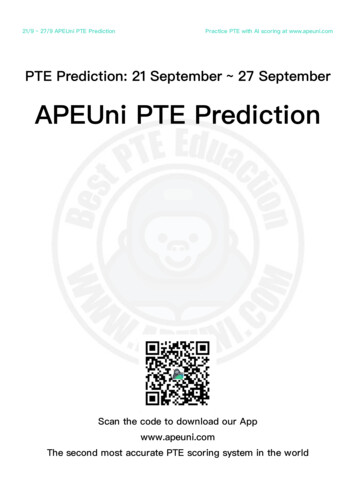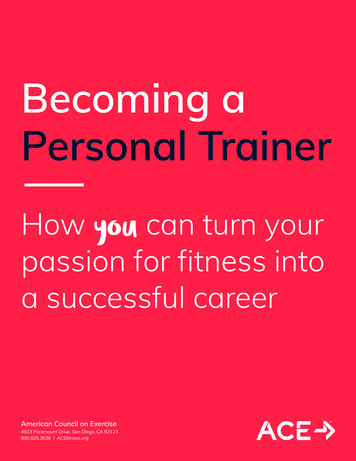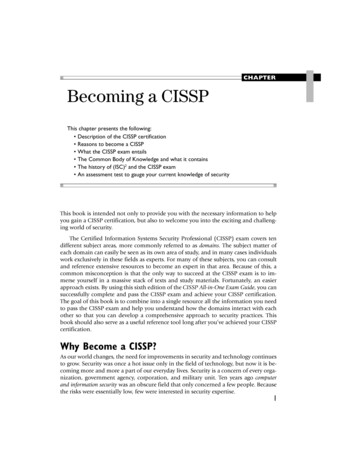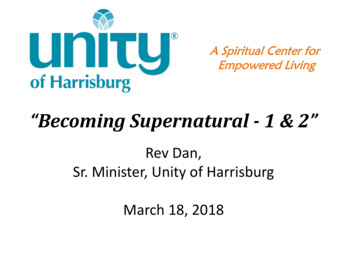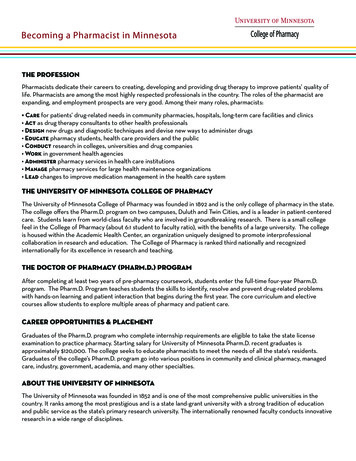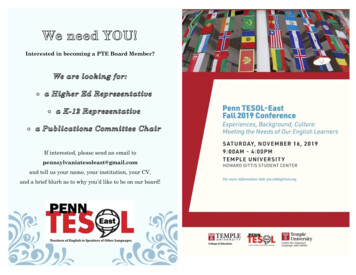
Transcription
Interested in becoming a PTE Board Member?If interested, please send an email topennsylvaniatesoleast@gmail.comand tell us your name, your institution, your CV,and a brief blurb as to why you’d like to be on our board!
November 16, 2019Dear Fellow ESL Professionals,Welcome to the 2019 PennTESOL-East Fall Conference! We are very pleased to beable to hold this year’s conference at the Howard Gittis Student Center at TempleUniversity. This year’s conference theme is “Experience, Background, Culture:Meeting the Needs of Our English Learners”. Given today’s socio-political climatesurrounding immigration, we as ESL professionals are on the forefront, ever ensuringthat our English language learners are receiving the best education in the safestpossible environment we can provide. Once again, Temple University will provide thebackdrop for our exchange of ideas and cultivation of professional relationships.We are honored that Kathrine Lobo will deliver the plenary for this conference titled“Facilitating and Fostering Preparedness Using the 6 Principles”, which will discussthe use of the 6 Principles to promote effective ESL pedagogy, including language,cultural, and survival skills for life in the 21st century. Kathrine is currently an ESLteacher at the Day Middle School in Newton, Massachusetts. Additionally, shepresently serves on the Board of Directors for TESOL International.In addition, to the plenary, we are pleased to have a variety of presentations so thatyou can learn and implement new pedagogical techniques into your own classrooms.Please read the presentation descriptions on the following page. Also, please be sureto check out the publisher’s tables. Visit them either in the morning, betweensessions, or during the lunch break.Please feel free to come up and say hello to the board members and provide them withany feedback you may have. You will complete the PTE conference evaluation formand then receive your stamped certificate of attendance. If you would like to become amore active member in PennTESOL-East, please ask us about joining the board.Finally, PennTESOL-East would like to thank Jacqueline McCafferty, Director of theTemple University Center for American Language and Culture (TCALC) and Dr.Elvis Wagner, Associate Professor of Teaching and Learning at Temple University’sCollege of Education for making possible the generous sponsorships it has received tohelp fund the conference.Sincerely,George LongbottomPennTESOL-East PresidentHolli GoldenbergPennTESOL-East Vice-PresidentPennTESOL-East Board of DirectorsPresidentTreasurerSecretaryGeorge LongbottomHarrington “Kit” CrisseyLeslie Kirshner-MorrisVice PresidentPast PresidentHolli GoldenbergCourtney KnowltonK-12 RepresentativesHigher Ed RepresentativesVacantVacantMembership CommitteeChairPublisher’s andAdvertiser's LiaisonRoger GeeHarrington “Kit” CrisseyTESOL LiaisonSociopolitical ConcernsChairPublicationsCommittee ChairLeslie Kirshner-MorrisVacantAdult EdRepresentativesGary FoxRoger GeeWeb AdministratorDebrah BaxterConference Committee MembersGeorge Longbottom, Holli Goldenberg, Harrington “Kit” CrisseyFor the latest educational products in ESL, visit the publisher exhibits area.National Geographic LearningArcadia UniversityTownsend PressMessiah CollegeCambridge University PressWest Chester UniversityTemple U. TESOL ProgramBooklink
PennTESOL-EastPennTESOL-East Conference Plenary SpeakerFall 2019 Conference – Temple University HGSCConference ScheduleKathrine Lobo10:00 a.m. - 10:50 p.m.,Howard Gittis Student Center (HGSC), Room 200ABTemple UniversityPlenary TitleFacilitating and Fostering Preparedness Using the 6 PrinciplesRoom 200CCheck-In“Quick Start” Breakfast9:00-9:45Assorted Danish, Filled Croissants, Muffins served with FreshSeasonal Sliced Fruit, Bottled Water, Regular Coffee, decaffeinatedcoffee, and Hot Water with Assorted Tea BagsPlenaryRoom 200ABPresentation Kathrine Lobo – Plenary Speaker10:00-10:50“Facilitating and Fostering Preparedness Using the 6 Principles”Fostering Reflective Practice in Post-Observation MeetingsSantoi Wagner / Room 200ABFirst 40minuteSession11:00-11:50How to Become a Certified Google EducatorSamuel Adams / Room 217AHow the Literacy Council is Becoming the ESL Powerhouse in BerksCountyRyan Breisch / Room 217BUsing Songs Effectively in ESL ClassesDaniela DiGregorio & Susan Featro / Room 217CPlenary DescriptionTESOL professionals are facilitators of learning, that not only includes languagebut also culture and survival skills for life in the 21st Century. Developingeffective communication skills, critical thinking and the discourse of advocacy arekey. This plenary will utilize The 6 Principles of effective teaching TESOLinitiative. This framework is well-suited to the third decade of the 21st centuryand can be used by educators to cultivate and foster preparedness for what is tocome.BiographyKathy Lobo is an ESL teacher with experience in both private and public schoolsin the US as well as in Australia, Hong Kong and Japan. Presently she is an ESLteacher at the Day Middle School (grade 6-8) in Newton Massachusetts, and sheis an Adjunct Professor at Brandeis University and Lesley University in Walthamand Cambridge, Massachusetts. Kathy has extensive experience conductingworkshops and making presentations that includes visits in Australia, China,Sudan and the United States. She has served on professional boards for theMassachusetts Association of Bilingual Educators (MABE) and theMassachusetts Educators of English Language Learners (MATSOL). Presentlyshe serves on the Board of Directors for TESOL International.Implementing Universal Design for Learning to Support Studentswith DisabilitiesAmanda Brunson & Jackie Whitney / Room 217DMeeting the Needs of Chinese ELs: Experiences at USTCSarah Rawls, Lu Han, Linlin Wang, & Catie Duffield / Room 200ABFirst 20minuteSession11:55-12:20Building Fluency in East Asian International Students’ SpeechJhane Campbell / Room 217AFREE Digital Tools and Applications to Enhance Communication forELs and their FamiliesChristine Maine / Room 217BMoving Past Grammar, Spelling, and Punctuation to Assessing ELs’Understanding of ContextMageara Glah-Mabry / Room 217CFreedom through Structure: Re-envisioning the Rhetorical SituationHannah Lair / Room 217D
The 6 Principles for Exemplary Teaching of English Learners,PreK through Grade 12Kathrine Lobo / Room 200ABFirst Lunch(Red Ticket)12:25-1:10Room 200C“Heartland Buffet” LunchGrilled Lemon Rosemary Chicken served with Baby SpinachSalad, Bakery Fresh Rolls with Butter, Roasted NewSecond Lunch Potatoes, Fresh Herbed Vegetables, Oreo Blondies, Bottled(Blue Ticket) Water, and Lemonade1:05-1:55Technology’s Impact on Language AssessmentElvis Wagner / Room 200ABAn Alternative Model of Teaching Grammar inContextDodi Zain / Room 217ASecond20-minuteSession2:00-2:25Practical Teaching Strategies to Increase StudentEngagement and InteractionFangyan Cao & Yao Lu / Room 217BThrough Their Eyes: How Students with Limited andInterrupted Formal Education and Trauma View theEffectiveness of a College Bridge ProgramSharon Haseman / Room 217CSecond40-minuteSession2:35-3:20Third 40minuteSession3:30-4:15Extended Reading with Life Lessons: The Longevity ProjectKenneth Cranker / Room 217AWin – Win!: Student Generated Materials Increase Engagement andAdaptabilityNonie Bell & Nicole Servais / Room 217BEngaging Domestic & International Students in a Semester-LongCultural Exchange ProgramErica Johnston & Mary Scholl / Room 217CTeaching Reading and Culture through Classic Literature: ATeacher-Training ModuleSarah Peterson / Room 217DPRESENTATION DESCRIPTIONSFIRST 40-Minute Session: 11:00-11:45Santoi Wagner, Senior Lecturer, University of PennsylvaniaFostering Reflective Practice in Post-Observation Meetings, Room200ABEasily Adopted and Adapted Strategies forIncorporating Sound in the Writing ClassroomJohn Andelfinger / Room 217DThis workshop will explore how mentors, supervisors, and peer observers canfoster reflective practice during post-observation meetings with teachers. Wewill use data from actual meetings to discuss productive interactional strategies.Participants will deepen their understanding of how to effectively engage andsupport reflective practice. All TESOL professionals are welcome.Is it Plagiarism or Just Inexperienced Borrowing?How to Notice and Build upon El’s Textual BorrowingSkillsJill Swavely / Room 200ABFocus: Primary/Secondary Education, Academic English Programs, AdultEducationMeasuring ELL Success, by What Scale?Nonie Bell, Jackie Whitney, & Jim Weaver / Room 217APrinciples of Assessment and Improving AssessmentDesignMichael Fields / Room 217BOnline Language Learning in K-12Susan Featro / Room 217CImpact of CLT in Improving Speaking Skills: A CaseStudy of Attitude in a Saudi EFL ContextNaif Masrahi / Room 217DSamuel Adams, Instructional Technology Specialist, Temple UniversityCenter for American Language and CultureHow to Become a Certified Google Educator, Room 217AThe Google Suite for Education tools are widely used in language learning at allgrade levels. ESL teachers can benefit from self-paced training while alsogaining certifications that demonstrate their technological competency. In thissession, participants will learn how to prepare to obtain the Google CertifiedEducator Level 1 certification.Focus: Primary/Secondary Education, Academic English Programs, AdultEducation, Graduate/Post-Graduate Academic and Professional Programs,Intensive English Programs/Private Language Teaching Programs
Ryan Breisch, Executive Director, Literacy Council of Reading-Berks INC.How the Literacy Council Becoming and ESL Powerhouse in Berks County,Room 217BEnglish Forward is an innovative, research-based training system and curriculumdesigned to give teachers the tools to bring the real world into their classrooms andprovide students the knowledge they need to navigate their communities and dayto-day life. Participants will hear a brief history of how English Forward came tothe Literacy Council of Reading-Berks, how volunteers are identified and recruitedto participate in the program, and how English Forward is being used to engage thecommunity and Beginning Literacy ESL students in their first 60-100 hours ofEnglish-language instruction.Focus: Adult EducationDaniela DeGregorio & Woonji Yeoh, Wilson CollegeUsing Songs Effectively in ESL classes, Room 217CUsing music in ESL classes is beneficial for developing English skills, creating nonthreatening classroom environment, encouraging creativity, and bringing fun tolearning. This presentation demonstrates how songs can be used effectively in ESLclassrooms. The presenters will provide specific examples of songs and engage theaudience in song activities.Focus: Primary/Secondary Education, Intensive English ProgramsAmanda Brunson & Jackie Whitney, University of DelawareImplementing Universal Design for Learning to Support Students withDisabilities, Room 217DThe purpose of this session is to raise awareness about ESL students withdisabilities, to explain Universal Design for Learning, and to provide concretestrategies for implementing UDL in the classroom. The audience will learn howthey can make their ESL classes more accessible in order to benefit all students.Focus: Academic English Programs, Intensive English Programs/Private LanguageTeaching ProgramsFIRST 20-Minute Session: 11:55-12:20Sarah Rawls, Lu Han, Linlin Wang, & Catie Duffield, ESL Instructor andGraduate Student, Temple UniversityMeeting the Needs of Chinese ELs: Experiences at USTC, Room 200ABUnderstanding challenges and useful strategies that students, teachers, andinstitutions have teaching/learning English to Chinese STEM students is helpful inimproving English teaching in EFL contexts. An action research was conductedanalyzing three teachers’ teaching journals, self-reflection essays, and focusedgroup meeting notes to address these aspects.Focus: Academic English Programs, Graduate/Post-Graduate Academic andProfessional Programs, Intensive English Programs/Private Language TeachingProgramsJhane Campbell, Graduate Student, University of DelawareBuilding Fluency in East Asian International Students’ Speech, Room 217AThis session addresses how educators can improve fluency in international Asianstudents with weak speaking abilities. Often, these students are shy, rely on theirnative language, or stay silent as a result of this weakness. Participants in thissession will gain strategies for encouraging students to speak more fluently.Christine Maine, Graduate Student, University of DelawareFREE Digital Tools and Applications to Enhance Communication for ELsand Their Families, Room 217BAdvances in technology are opening multi-lingual tools for accessing information.These are “GAME CHANGERS” for our English Learner (ELs) and for us. Thispresentation is a quick introduction to free digital tools available to help our ELsand their families access communication.Focus: Primary/Secondary Education, Academic English Programs, Adult EducationMegeara Glah Mabry, Program Manager, Temple UniversityMoving Past Grammar, Spelling, and Punctuation to Assessing ELs’Understanding of Content, Room 217CWriting is often used as a reading assessment tool, but for students who struggle towrite in English, this serves as a double assessment--both of their readingcomprehension and their writing abilities. Better assessment tools can ensure ourstudents’ English writing level does not influence our assessment of readingcomprehension.Focus: Secondary EducationHannah Lair, Lecturer in English Composition, Penn State UniversityHarrisburgFreedom through Structure: Re-envisioning the Rhetorical Situation,Room 217DStudents of varied cultures and educational backgrounds populate the universitywriting course, often presenting challenges to instructors tasked with academicwriting objectives: how is one to meet each student where she is? This sessionexplores a method for creating common academic and social ground in theclassroom through the emphasis on structure. By re-envisioning the rhetoricalsituation and re-framing Anglo-American writing structures, both instructors andstudents can achieve a sense of agency while adhering to academic requirements.Focus: Academic English ProgramsSECOND 20-Minute Session: 2:00-2:45Elvis Wagner, Associate Professor of TESOL, Temple UniversityTechnology’s Impact on Language Assessment, Room 200ABTechnology is changing how L2 proficiency is assessed. This presentation examinesthe current role of technology in high-stakes English proficiency tests (i.e., TOEFLiBT, IELTS, PTE, DET), the advantages and disadvantages of technology inassessment, and explores how technology might dictate changes in languageassessment in the near future.Focus: Academic English Programs, Adult EducationDodi Zain, University of ArkansasAn alternative model of teaching grammar in context, Room 217ATeaching grammar for ESL/EFL settings is still considered essential by manystudents and teachers despite its boring nature. The presentation will present analternative model of teaching grammar in context by incorporating the principles ofCommunicative Language Teaching with additional elements of fun activities.Focus: Academic English Programs, Intensive English Programs/Private LanguageTeaching Programs
Focus: Academic English Programs, Intensive English Programs/Private LanguageTeaching ProgramsFangyan Cao & Yao Lu, University of DelawarePractical Teaching Strategies to Increase Student Engagement andInteraction, Room 217BThis session addresses how educators can assist students to engage and interactmore in their classes. Teachers can benefit from implementing strategies thatcreate a student-centered and dynamically involved learning environment. By theend of this session, participants will understand and have three strategies: TVseries, drama, and music.Focus: Adult EducationSharon Haseman, ESL InstructorThrough Their Eyes: How Students with Limited and Interrupted FormalEducation and Trauma View the Effectiveness of a College BridgeProgram, Room 217CThis research explores the perceptions of adult English learners regarding a bridgeprogram designed to ensure their college readiness. Participants in this researchare SLIFE (students with limited and interrupted formal education) who areeligible to apply for refugee status, and have also experienced trauma.Focus: Academic English Programs, Adult EducationJohn Andelfinger, Director of Institutional Advancement andAccreditation, Holy Family UniversityEasily Adopted and Adapted Strategies for Incorporating Sound in theWriting Classroom, Room 217DThe presenter will share diverse ways in which sonic practices can be integratedinto an undergraduate writing class for multilingual writers. The presenter willbriefly share his journey towards incorporating sonic writing practices and providedetails about what was effective and ineffective in classroom practice.Focus: Academic English ProgramsSECOND 40-Minute Session: 2:35-3:20Jill Swavely, Professor, Temple UniversityIs it plagiarism or just inexperienced borrowing?: How to notice and buildupon ELs’ textual borrowing skills, Room 200ABPresenters will explain an analysis of textual borrowing practices in essays writtenby 102 English learners in 7 local high schools to illustrate these students’emergent understandings of using source texts in their written essays. Then, thepresenters will share practical instructional strategies for building upon theseemergent understandings.Focus: Secondary Education, Academic English Programs, Intensive EnglishPrograms/Private Language Teaching ProgramsNonie Bell, Jackie Whitney, & Jim Weaver, Instructors, University OfDelaware ELIMeasuring ELL Success, By What Scale?, Room 217AAccurate and valid assessments are vital milestones of progress that help ELLsdirect their own learning. Three IEP instructors will present the benefits anddrawbacks of their differing approaches to assessment informed by SLA research.Michael Fields, Assistant Professor, University of Delaware ELIPrinciples of Assessment and Improving Assessment Design, 217BThis presentation reviews principles of language test design and suggests ways toimprove the quality of teacher-made tests. Concepts to be reviewed include constructdefinition, construct underrepresentation and construct-irrelevant variance, muddiedmeasurement, direct testing, and correct format for testing different language skills.Focus: Adult Education, Academic English ProgramsNaif Masrahi, Ph.D. Student, University of New MexicoImpact of CLT in Improving Speaking Skills: A Case Study of Attitude in aSaudi EFL Context, Room 217DThis presentation reports on the results of a study on the attitudes of EnglishLanguage instructors towards adopting the Communicative Language TeachingApproach in developing the speaking skills of Saudi EFL learners. The presentationaddresses the study’s methodology, outcomes, challenges and recommendations forfurther studies.Focus: Academic English Programs, Adult Education, Graduate/Post-GraduateAcademic and Professional Programs, Intensive English Programs/Private LanguageTeaching ProgramsTHIRD 40-Minute Session: 3:30-4:15Kathrine Lobo, ESL Teacher, Day Middle School, MassachusettsThe 6 Principles for Exemplary Teaching of English Learners, PreKthrough Grade 12, Room 200ABThis will include the rationale for The 6 Principles, as well as the application.Participants will discuss how to best implement The 6 Principles from the perspective ofboth an administrator and teacher.Focus: Primary and Secondary EducationKenneth Cranker, Assistant Professor, University of DelawareExtended Reading with Life Lessons: The Longevity Project, Room 217AExtended reading is long reading that may be above student reading level. It isused in an Academic Transitions program to quickly pull students up to auniversity reading level. Attendees will learn how employing The Longevity Projectin an integrated-skills context improves
Temple University Plenary Title Facilitating and Fostering Preparedness Using the 6 Principles Using Songs Effectively in ESL Classes Daniela DiGregorio & Susan Featro Plenary Description TESOL professionals are facilitators of learning, that not only includes language but also culture and survival skills for life in the 21st Century. Developing

